Mark Robinson: The AFL’s umpire dissent crackdown will have serious implications on players
AFL players under 25 don’t have the brain development to control their reaction to umpire decisions - Mark Robinson explains why.
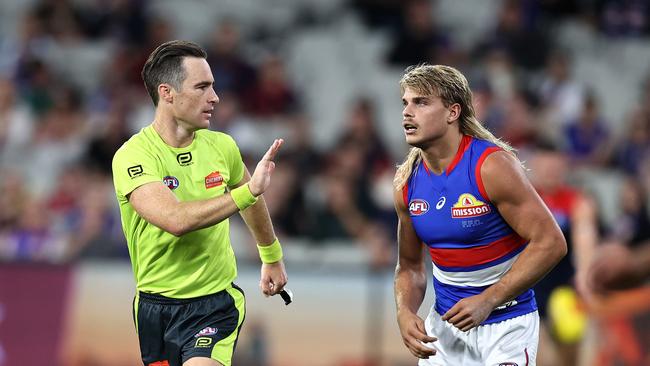
AFL
Don't miss out on the headlines from AFL. Followed categories will be added to My News.
The AFL needs its head read, according to sports psychologist Jacqui Louder.
The 21-year professional says that what the AFL is asking players to do in the heat of battle — to not show emotional dissent towards umpires — is virtually impossible for the majority of players.
And it’s impossible because part of the brain — specifically the amygdala — allows for an unconscious reaction to, in this case, the umpire’s whistle and decision.
“As psychologist in elite sport, I can give you relaxation muse, and train you in mindfulness and emotional awareness, but what I can’t do is I cannot change the physiology and the mechanics of the brain when they are in stress mode,’’ she said.
“It is literally an unconscious immediate reaction because that’s what the brain does.’’
Her message to the AFL is: “Allow humans to be human.”
Stream every match of every round of the 2022 Toyota AFL Premiership Season Live & Ad-Break Free In-Play on Kayo. New to Kayo? Try 14-Days Free Now >
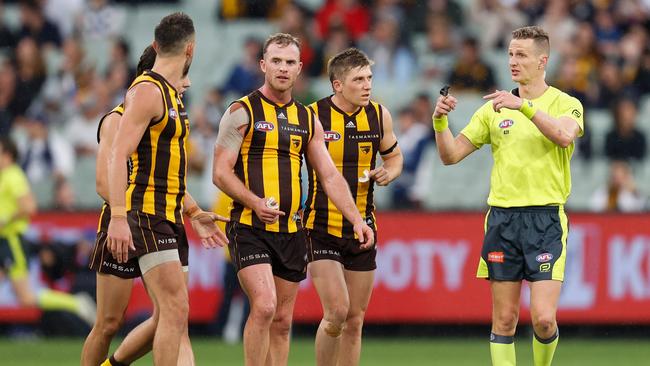
The decision to introduce a no-dissent policy was made, she said, with good intentions but without the support of science.
And it could have lasting psychological damage for players.
“It’s ignorant,’’ Louder said.
“Because the AFL is not in this area and they don’t understand how emotions actually work, they’ve made a decision without an educated understanding.
“I don’t think there’s any malice in it, but I don’t think they understand the complexities of how the brain works under stress conditions and how quickly things happen and what is an unconscious reaction.
“A lot of times when the player is throwing his arms up or shaking their heads, it’s actually at themselves, it’s not actually at an umpire, so you just can’t look at a behaviour and automatically say that’s dissent.
“We’ve got highly competitive beings with the highest testosterone levels of their life, being in their 20s and 30s, and a huge amount of our players who have underdeveloped brains.
“And the two parts of your brain which are involved in this emotional stuff are your amygdala — which is where your stress comes from — and your frontal lobe, which is where your thinking is.
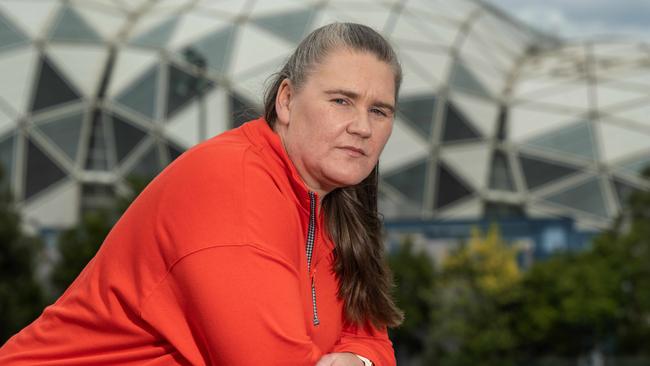
“And the frontal lobe is the last part of your brain to fully develop and that’s at the age 25.
“These kids are 18, 19, 20 who are just trying to figure out and manage the whole situation and emotion and everything else and learn how to be elite athletes, and now we’re saying to them, ‘you have to have the emotional maturity of someone with a fully developed brain and to basically fight the reaction of how a human brain works’.
“Like, give me a break.
“I’m sitting here as a psychologist so frustrated at what they are asking these young men to do. It’s not possible for them, it’s not possible for many of them.’’
The contentious dissent crackdown at the start of the season was introduced, in part, because of the drastic shortfall of community umpires needed for upcoming men’s and women’s matches.
Rolled into that was the respect aspect.
The AFL accepted blame for allowing it to diminish over recent years.
The Toby Greene confrontation with a field umpire in a final last year, which eventually earned him a six-week suspension, and social media commentary by Collingwood leaders Scott Pendlebury and Taylor Adams in support of Greene’s actions, helped prompt the AFL crackdown.
The issue exploded this year when Brisbane’s Harris Andrews was told “arms up is 50, mate” after a free-kick was awarded against the Lions and then a 50m penalty was paid against him.
AFL football boss Brad Scott then reiterated there would be zero tolerance to umpire dissent, although it appeared that incidents last weekend, when players reacted to umpire decisions, were not penalised.
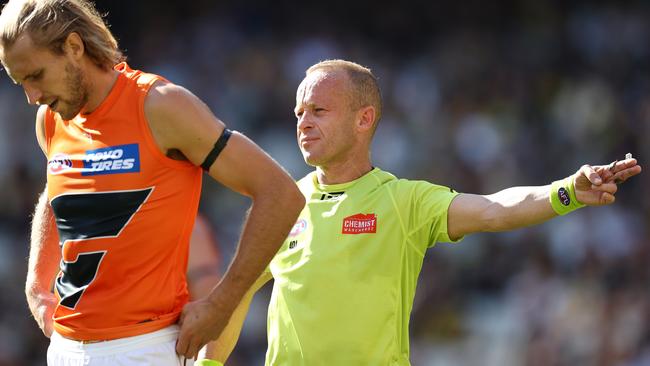
SCIENCE OF SIX SECONDS
Louder says the science of emotion is complex.
An expert who currently works with Melbourne Storm and Collingwood in the AFL, and who has previously worked with Swimming Australian, Tennis Australia, North Melbourne and on the dirt bike circuit, Louder said the brains of elite sports people were not designed to be impassive in high-stress moments.
“You’ve got to factor there are different personalities,’’ she said.
“You’re very, very competitive, high adrenaline athletes and if they’re actually thinking about the actual competing situation they are in and all of a sudden the whistle goes, well, you feel before you think.’’
When that happens it’s called “emotional hijacking’’.
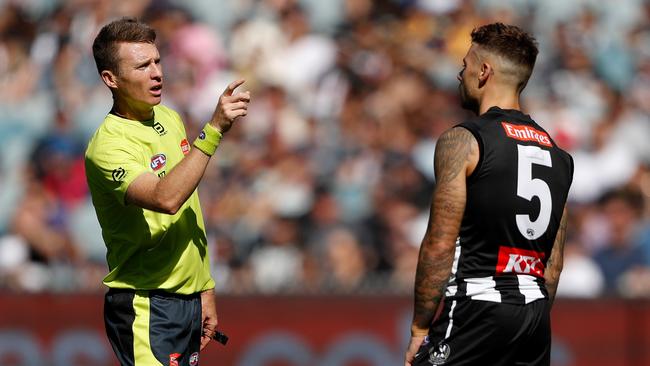
And it last for about six seconds.
“Where instead of your brain operating immediately out of your frontal lobe, it actually goes through your amygdala which is where your stress hormones come from, and that’s the protective zone which is what causes your initial reaction to things,’’ Louder explained.
“So, when your brain gets hijacked by that amygdala to protect you and goes into that initial, emotional reaction, the re-routing of that around your amygdala and before you get to the thinking part of your brain, takes six seconds.
“And in that six seconds is when you will see an emotional, unconscious reaction. So, when you see them throw their hands up or shake their head, that is an unconscious reaction when it happens immediately.
“So, we have a cohort here and some players who are very, very competitive, high-stress people that are not going to ever be able to control this and they will give 50m penalties away and lose games and then they’ll feel awful for their team.’’
She argued mature players would be less likely to give away 50m penalties because they better “understood their emotions’’.
“But if you are a young person or a person who already has an anxious personality you’re the exact player who may find this very, very difficult and impossible.
“So, AFL, don’t make decisions in an area you don’t understand, get your info first.
“I understand what they are trying to do but don’t make my job that impossible.’’
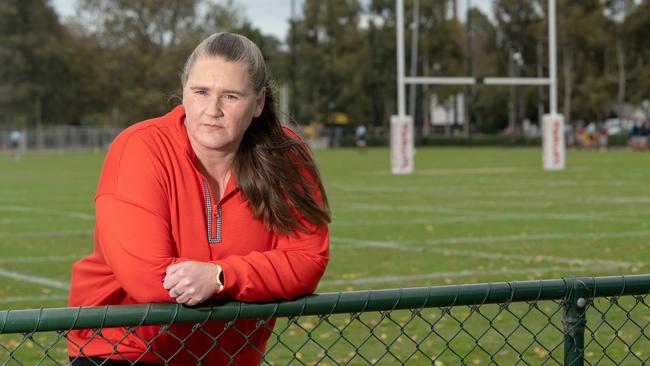
EMOTIONAL ROLLER-COASTER
As well as working for the Pies, Louder sees players from other clubs at her office at Olympic Park.
Already dealing with players about the stress of performances and, in some cases, the stress brought on by media commentary and opinion, Louder warns that some players could suffer lasting issues because of their “unconscious’’ reaction to the whistle.
She said a player giving away a 50m penalty and costing a goal, and maybe the match, is “emotionally a lot of work for us to go through with them through the week’’.
“The mates get around them, but that shame, that disappointment, that frustration within themselves …
“Another side is, it’s very dependent on what the personality of your coach is. If you have a coach who also doesn’t control his emotion, or gets involved too much in the game, where they say something to that player in the moment, that can impact relationships as well
“There’s so much at play when we’re talking about relationships inside a player.”
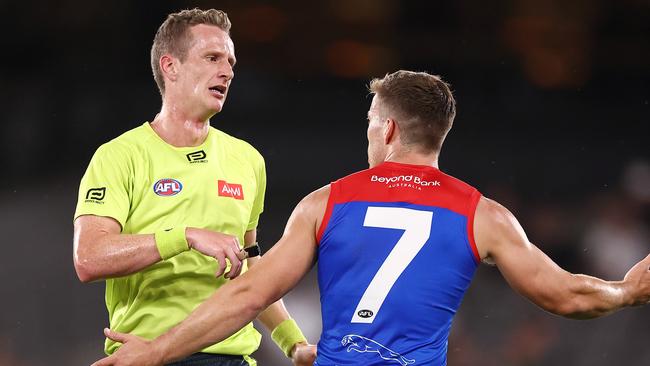
Media plays its role, she said, which affects the player, friends and families.
“They are human beings and sometimes there are other things at play, and sometimes the biggest win for us is getting a player on the field, because you don’t know what they’ve gone through during the week,’’ she said.
“It’s just a bit of human consideration.
“When you’re bullying and using your voice and forum in the media to create a very specific narrative around players, just think about the damage you’re potentially doing.”
So, is the AFL causing emotional damage with its dissent crackdown?
“The AFL needs to be aware that what it’s doing is causing frustration and, as I said, we can’t rewire the brain to stop that initial reaction,’’ Louder said.
“Where it will cause major problems is if a very competitive player or someone who already has anxiety and high levels of stress, if that player feels like they lose a game for their team, that emotionally is huge.
“Players carry things because they care about their performance and they care about their teammates.
“This will backfire at some point and when it does, it’s not the AFL who mops up the mess or work that player through stuff.”
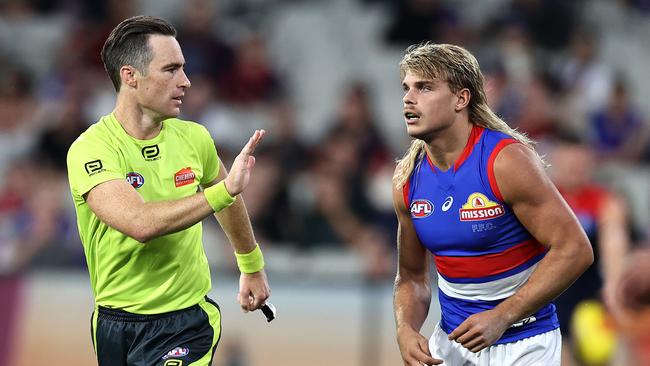
UMPIRES ARE KEY
High profile umpire Ray Chamberlain this week praised the players for their “exemplary” response to the efforts to eradicate dissent and disrespect.
“All power to them,” he told SEN, “and umpiring is a significantly better experience … overwhelmingly more enjoyable.’’
But the question remains: Was player dissent such a major issue to demand the seismic shift to zero tolerance?
In the week leading up to the Community Umpiring Round, one experienced community umpire wrote on social media under the name Trevor Green, the issue was with parents, not players.
“Umpired an U/12s D grade Football match last Sunday with my 15 y/o son, learning the trade,” he wrote.
“So, for those that don’t understand why the AFL is cracking down on dissent, this may help them understand.
“Right from the first minute of the game the coaches and parents of both teams are calling out decisions on every play and in an over emotional way. What an horrendous example these adults are setting for these children learning the game.
“This example can permeate the field with these 11 year olds following their lead and yelling for decisions while the game is in motion, clearly taking focus off how they should be playing.
“The reality is that these children are making a million more mistakes than the umpires and if the coaches and parents could fix even a little of this, the team and individual improvement would be outstanding. Maybe they don’t know how?
“This is the commencement of learning the umpiring bashing culture, it starts young.’’
Perhaps the AFL could further target parents and coaches for more education and not target the instinctive reactions of players in highly intense moments.
The problem is humans will be human.
More Coverage
Originally published as Mark Robinson: The AFL’s umpire dissent crackdown will have serious implications on players





